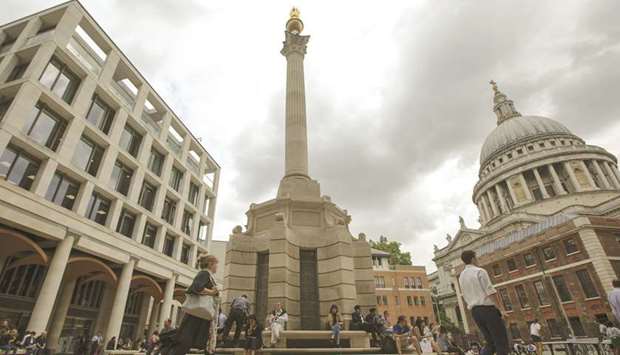European stock markets fell yesterday as investors become increasingly by rising virus infections, new lockdowns, a slowing economic recovery, stalled US stimulus talks and US election uncertainty.
Global equities have notched up impressive gains in recent months, but the so-called “bull” run has sputtered to a halt in the past few weeks, as expectations fade that a wave of fresh cash from governments and central banks will be sufficient to kick-start the economy.
“Markets are digesting and grappling with this idea that the growth expectations that investors have might not materialise,” said Lauren Goodwin at New York Life Investments.
“As the fiscal impulse in the US starts to wane, some of these expectations for a slow and steady recovery are shaken.”
The latest example was a rise in US jobs claims for the week of September 19, despite expectations they would drop, though in midday New York trading, the Dow Jones index rebounded from early losses to show a gain of 0.5%.
In Europe, the FTSE 100 index in London closed 1.3% lower at 5,822.78 points, Frankfurt’s DAX 30 ended 0.3% down at 12,606.57 points and Paris’ CAC 40 finished 0.8% at 4,762.62 points, while the EURO STOXX 50 lost 0.6% to close at 3,159.64 points.
Markets continued “to grapple with a host of uncertainties,” the Schwab Market Update noted.
With the northern hemisphere now heading into autumn and winter, there is also concern that a second wave of coronavirus will force the reimposition of strict, economically devastating containment measures.
France is shutting bars and restaurants in its second-biggest city Marseille and putting it on “maximum alert”, while several other cities, including Paris, will see new restrictions as well.
Britain’s government has also shortened pub opening hours and has warned of other measures, while Spain’s Madrid region has locked down roughly 850,000 people and plans to extend its curbs.
“Investor’s expectations for a slow steady recovery have been tested in this month,” Geir Lode, head of global equities, international at Federated Hermes wrote in a note.
“With the recent sentiment change in the market, it should be remembered that market volatility still exists. Exceptionally low interest rates and ample liquidity give investors few choices other than to invest in riskier assets.”
M&A speculation drove a 1.3% rise in Italian banking stocks, while the European banking index slipped 0.4%.
Italy’s third-largest bank Banco BPM jumped 5.8% and Credito Valtellinese surged 11.6%, with traders citing a Bloomberg report that suggested talks of possible takeover interest from French bank Credit Agricole.
Earlier, a Banco BPM spokeswoman said it was not in contact with bigger rival UniCredit over a potential merger, dismissing a press report. UniCredit rose 2.3%.
Surveys showed business morale in Germany and France improved for the fifth month in a row in September, suggesting that both countries are set for strong growth in the third quarter.
The relief, however, proved temporary, with US markets hesitating to rise after a surprise rise in weekly jobless claims.
Under the “more targeted” programme, Finance minister Rishi Sunak said government support would only be available to workers whose employers keep them on at least a third of their normal hours.
British cinema operator Cineworld slumped 14.8% as it swung to a loss and said it may have to raise more money if pushed to shut its theatres again due to government curbs on social gathering.
US traders are now growing concerned that rising infections at home could see similar moves, and several Federal Reserve officials, including chief Jerome Powell, have called for a new stimulus package to mitigate the impact.
But politicians on Capitol Hill appear deadlocked ahead of the presidential election in November.
Michael Hewson at CMC Markets said: “The main problem the Fed has is that US politicians appear more interested in fighting an election campaign than helping to pass a new stimulus plan which would help the American people.”

Pedestrians pass the London Stock Exchange Group headquarters. The FTSE 100 index closed 1.3% lower at 5,822.78 points yesterday.
